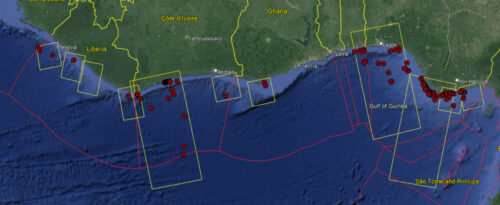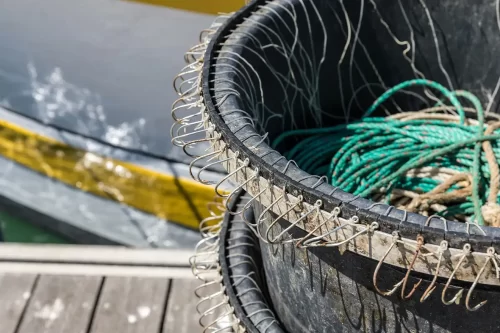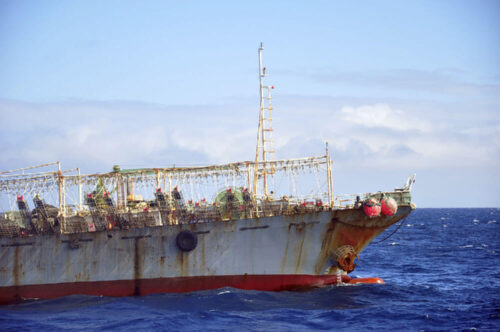The Pacific Islands Forum Fisheries Agency sees an important link between ethical treatment of workers and sustainable fishing and is taking action to address both
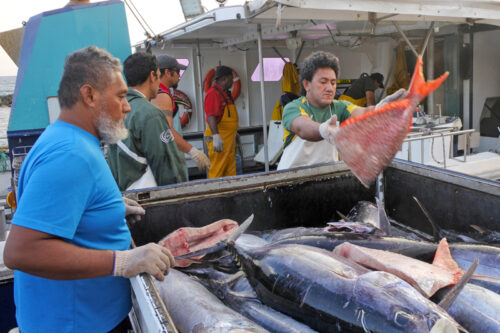
The 2021 Human Rights Day focuses on reducing inequalities and advancing human rights. This work is vital in the fisheries sector, where we know that significant abuses occur, and are still grappling to understand the scale. Traditional governance efforts have focused on ensuring legal, sustainable seafood. But the international ocean community is coming to realize that there is no sustainability without decent work in fisheries.
The Pacific Islands Forum Fisheries Agency (FFA) strengthens national capacity and regional solidarity so its 17 members can manage, control and develop their tuna fisheries now and in the future. To achieve this important goal, the FFA recognizes they must focus on both the fish and the people working in fisheries. As Global Fishing Watch continues to advance our own efforts to tackle forced labor in the sector, we recognize that our solutions will only be useful if they are developed in collaboration with those on the ground. In order to learn from leading initiatives on this complex topic, Global Fishing Watch’s John Maefiti spoke with Dr. Manumatavai Tupou-Roosen, Director General of the FFA.
This interview has been edited for clarity and length.
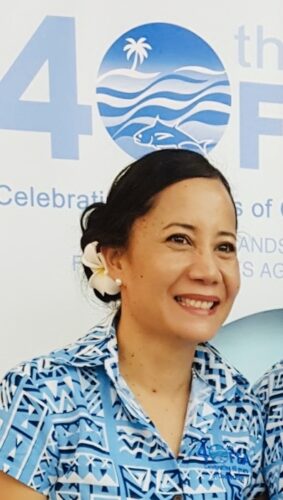
Global Fishing Watch: How is the FFA working to address labor issues in Pacific fisheries?
Dr. Tupou-Roosen: As endorsed by FFA ministers, addressing labor issues in the Western and Central Pacific tuna fishery is a top priority for our membership. FFA is working on two fronts, one focused on FFA membership and the other on members of the Western and Central Pacific Fisheries Commission (WCPFC).
Within our own membership, the Forum Fisheries Committee ministers approved an addition to the Harmonised Terms and Conditions for Fisheries Access in July 2019, covering labor standards for fishing crew. The Crewing Minimum Terms and Condition of Access for Fishing Vessels (MTCs) sets out requirements for the employment of crew on all fishing vessels that are licensed to fish in the waters of FFA member countries.
The provisions are broadly based on the International Labour Organization (ILO) Work in Fishing Convention and include the following requirements: a written contract in a language each crew member can understand; protection of the basic human rights of the crew in accordance with accepted international human right standards—including provisions for fair and dignified treatment and against assault, torture, cruel, inhumane or degrading treatment; procedures covering the death of a crew member and for advising next of kin in the event of an emergency; fair remuneration; coverage by the employer of insurance and travel costs; provision of medical care; rest periods; and provisions for health and safety, proper accommodation, sanitary facilities and suitable meals and water.
Members can meet requirements either by making them part of license conditions or including them in legislation and regulations. The secretariat has been working with members that have requested assistance in the implementation, including Fiji, Palau, Papua New Guinea, Tokelau, Tuvalu, Solomon Islands and Vanuatu.
FFA is also party to a New Zealand-funded project on labor standards for fishing vessels, led by the International Office of Migration with the ILO and the United Nations Office on Drugs and Crime.
The multi-agency approach is a reflection of the complexity of the issue of labor standards given the associated issues of human trafficking, forced labor and modern slavery. Funding under the project will allow FFA to focus on the enforcement of the crewing MTC, including procedures for the inspection of vessels and training for officers to identify possible violations of the MTC.
We are also working to address labor issues with the broader membership of the WCPFC. FFA members are strongly supportive of an Indonesian proposal for a binding measure on labor standards for fishing crew. The proposal was first introduced by Indonesia in December 2020 and has been progressed during intersessional work in 2021. This followed the successful push by FFA members for the adoption of a resolution on crew standards in 2018. We will be working closely with others towards agreement of a binding measure in 2022.
Global Fishing Watch: How are human rights of fishers and sustainability of fisheries linked?
Dr. Tupou-Roosen: At first glance, the link between the human rights of fishers and the sustainability of fisheries might not be obvious, given that the first point deals with people and the second point deals with fish.
However, we see that link when we consider the relationship between labor standards and crew safety and illegal, unreported and unregulated (IUU) fishing.
The International Plan of Action to Prevent, Deter, and Eliminate Illegal, Unreported and Unregulated Fishing (IPOA-IUU) notes that operators of IUU vessels commonly deny crew fundamental rights concerning the terms and conditions of their labor. This includes wages, safety standards and other living and working conditions. Put simply, vessels that engage in illegal fishing are more likely to cut corners in terms of vessel safety and treatment of crew to offset the risks associated with fishing illegally.
We believe for a fishery to be sustainable it also needs to be socially responsible. We should maintain fish stocks at levels where they are not overfished and where overfishing is not occurring. We should also ensure that workers in the industry, including fishing crews, are well treated and free from exploitation.
Global Fishing Watch: How can information sharing and collaboration support safer, more decent working conditions?
Dr. Tupou-Roosen: Labor standards for fishing crews are a relatively new area for Pacific Island fisheries agencies, and it is an area where fisheries personnel may need training. Collaboration and information sharing with other agencies is essential. This was reflected in FFA’s initial approach to the issue when, in October 2017, a workshop was convened that involved national fisheries agencies and national agencies responsible for employment and working conditions. There are also a number of nonprofit organizations working in this space and their experience can add to the data and knowledge available.
IUU fishing vessels operators engaged in forced labor and crew abuse wish to avoid detection and the most effective way to lift the veil surrounding such practices is to collaborate and share information. This is particularly important for vessels operating in the tuna fishery, as most vessels fish in multiple jurisdictions.
Global Fishing Watch: One of the first fisheries bodies to take on such a huge challenge, the FFA is leading global efforts to ensure safe and decent conditions for fishers and observers. As their work continues, others must follow. There is no simple solution to these complex challenges. But, as outlined by Dr. Tupou-Roosen, collaboration is vital. A network of stakeholders must work together in order to make significant progress a reality. Transparent, accessible vessel and ocean data can provide vital information to all of those working to ensure that nobody can continue to operate illegally or abusively—undetected.
John Maefiti works on the forced labor risk team at Global Fishing Watch.
